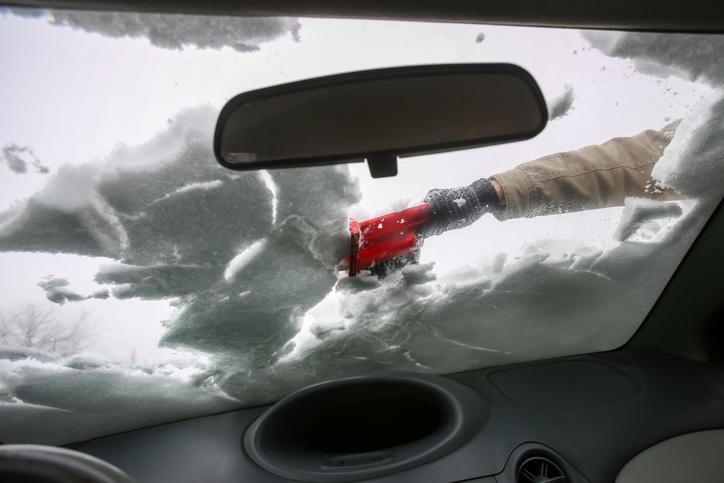How Weather Impacts Your Windshield
The weather in Alberta can be unpredictable and extreme. Each season presents challenges, from freezing cold temperatures in the winter to hailstorms, sweltering heat, and humidity in the summer. Your car’s windshield takes a lot of abuse from these elements. Find out how different weather conditions affect your windshield and care tips to protect it all year round.

The Impact of Cold Weather on Your Windshield
Extreme cold can be harsh on your windshield. When the temperature drops, the glass and the metal frame surrounding it contract at different rates, putting stress on the glass. This stress can cause existing chips and cracks to expand, sometimes with a dramatic popping sound, especially when using the defrost feature to melt ice and snow from the windshield.
Tips to Protect Your Windshield from Extreme Cold
- Clear ice and snow carefully: Avoid pouring hot water on the windshield to melt ice, which can cause thermal shock and cracks. Instead, use a plastic scraper and a de-icing spray to remove ice and snow without damaging the glass.
- Park indoors: Whenever possible, park your car in a garage or under a carport to shield it from snow and ice accumulation. This protects your windshield and reduces the amount of time you’ll spend scraping your car in the morning.
- Use antifreeze washer fluid: Regular washer fluid can freeze in extreme temperatures, so make sure to use one rated for cold weather.
- Fix small chips promptly: Rock chips and small cracks readily spread across the windshield during wintertime temperature fluctuations. Repair minor blemishes before they turn into large cracks that require windshield replacement.
The Impact of Hot Weather on Your Windshield
Summertime temperatures cause windshield glass to expand. If this expansion occurs unevenly, it can create stress fractures. The temperature difference from running the car air conditioner on full blast exacerbates these stress points. Prolonged exposure to direct sunlight also weakens the windshield over time, making it more susceptible to chips and cracks from flying rocks and debris.
Tips to Protect Your Windshield from Extreme Heat
- Park in the shade: Whenever possible, keep your car out of direct sunlight. Parking in the shade reduces the interior temperature and protects your windshield from heat damage.
- Use a sunshade: When parking in the sun is unavoidable, place a reflective sunshade inside your windshield. This reduces heat buildup within the car and protects the glass from excessive heat.
- Cool your car gradually: Gradual temperature changes are better for your windshield, so run the air conditioner at a lower speed and slowly increase it to full blast. It also helps to aim the vents away from the windows and avoid using the AC in defrost mode.
The Impact of Storms and Hail on Your Windshield
Hail can cause immediate and visible damage to the windshield, hood, and top of your car. Hail damage typically ranges from minor chips and dents to large cracks and more significant body damage. In extreme cases, hail can completely shatter the windshield. In addition to hail, high winds can cause debris to hit your windshield, resulting in chips or cracks. Severe storms can also weaken the seals around the windshield, causing leaks to form.
Tips to Protect Your Windshield from Storms and Hail
- Check weather forecasts: If hail is expected, park your vehicle in a garage or under a sturdy shelter, if possible. Keeping an eye on the forecast helps you plan ahead and protect your vehicle.
- Seek shelter: If you’re caught in a hailstorm while driving, find a gas station canopy, overpass, or other covered area to protect your car from damaging hailstones.
- Invest in a car cover: Specially designed car windshield weather protectors shield your glass from hail damage. These can be easily placed on your windshield when parked and removed before driving. You can also find padded covers that protect not only the windshield but the body of your car against hail damage. They absorb the impact of hailstones to prevent dents and cracks.
The Impact of Humidity on Your Windshield
High humidity affects your windshield in several ways. The moisture causes the metal frame around your windshield to expand, putting additional pressure on the glass. This added pressure strains existing chips or cracks, often causing them to spread across the windshield. Humidity also affects the adhesive holding the windshield in place. If the bond weakens, it can cause the windshield to loosen or develop leaks. Moisture trapped inside small cracks also expands when the temperature drops, causing further damage.
Tips to Protect Your Windshield from Humidity
- Check the seal regularly: Inspect the seals around your windshield for signs of wear. Damaged seals allow moisture to seep in, causing condensation, fogging, and water damage to your car’s interior.
- Park in a climate-controlled garage: A heated and cooled garage maintains a stable environment for your car, preventing excessive humidity and temperature fluctuations from affecting the windshield.
- Use a dehumidifier: Combat high humidity with a car dehumidifier, which reduces moisture levels inside the vehicle. This prevents condensation and fogging on your windshield.
Comprehensive Windshield Care from Auto Glass Solutions
Keeping your auto glass free of chips, cracks, condensation, and residue is the key to optimal visibility and safe driving. Auto Glass Solutions draws on over 30 years of industry experience to provide comprehensive auto glass services in Edmonton and Leduc, Alberta. We offer speedy, hassle-free windshield repair and replacement and would be happy to discuss your vehicle’s auto glass needs. Contact us at (780) 435-7852 today to request a quote. We look forward to keeping your windshield in excellent condition, no matter the weather.
““
